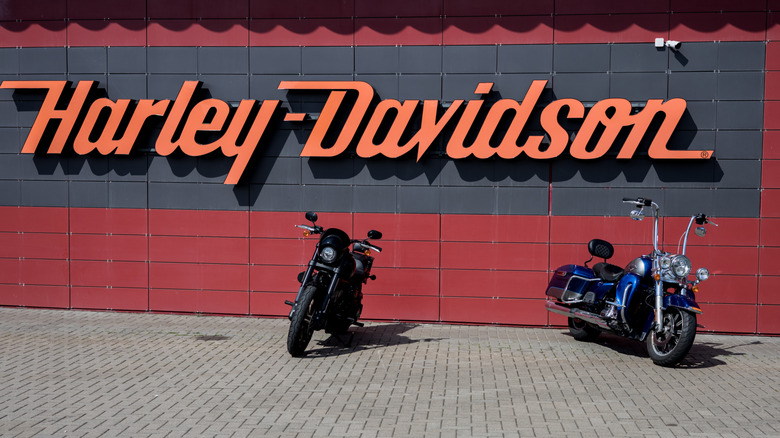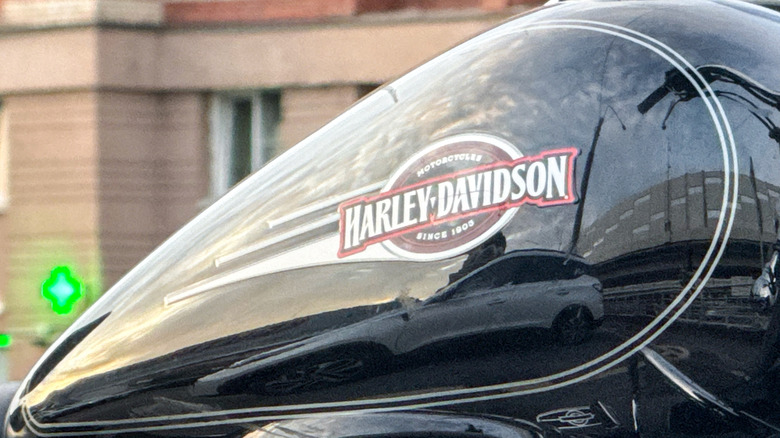Why Harley-Davidson Sued Honda In The 1990s
Part of corporate competition has to be, sometimes, acknowledging that a competitor has had a great and/or successful idea. The next stage is determining how to leverage that without directly copying anybody's homework. The grown-up world of trademarks and lawsuits isn't one to be taken lightly. To venture into the roomy, comfortable world of the cruiser motorcycle, then, is to tentatively approach Harley-Davidson territory.
Now, Harley makes a lot of things besides motorcycles, and it didn't invent the cruiser as a concept, but it's become synonymous with this type of bike, and it takes it very seriously. When Honda's American Classic Edition of the Shadow arrived in 1995, a version that swapped out the dual crankpin design of the existing Shadow for a single — as well as sporting a more conventional U.S. cruiser look –it was problematic for Harley's legal team. What looks, performs, and sounds like a Harley, but isn't one? The answer was: a lawsuit.
There were undeniable similarities, with aspects such as the shaping of the gas tank being a little too close for comfort. It was because of this, then, that legal proceedings against Honda began. In 1996, Harley's trademark attorney Joseph Bonk, per SouthCoast Today, stated that "there are people trying to duplicate the sound" of a Harley cruiser, which he described as "very fast, 'potato-potato-potato."' Harley-Davidson dropped the case with no definitive conclusion reached by either side early in the new millennium, but this wasn't before other Japanese motorcycle manufacturers were also placed under fire for, in Harley's view, trying to imitate the brand's famously potato-like sound. The mid-to-late '90s was a busy time in the world of cruisers, and seemingly a crowded one too. Harley-Davidson's history is long and storied, and this is one event where a line was drawn.
The trouble an engine sound can cause
The crux of the legal proceedings was whether an engine sound, however distinctive, can be trademarked. Harley-Davidson pushed for just that, with the Los Angeles Times quoting company spokesman Steven Piehl boldly declaring that the signature noise "has been Harley's sound since the 1930s." The March 1996 report went on to note that nine attempted rebuffs to such claims would be heard later that year, from other V-twin motorcycle developers including Yamaha, Suzuki, and Honda.
Harley's argument was that the specific angle and arrangement of the components of the V-twin result in its signature cacophony. The counter-claim, meanwhile, was that V-twin engines essentially all sound the same. Naturally, there was no concept of trademarking the V-twin design itself, and so this was the debate. The newspaper spoke to one Michael Hamm, an expert in customizing these components of bikes, who stated, "short, large diameter pipes give a deep, rumbling sound. And the type of muffler you use also contributes to the final tone." From this, it seems that Harley's suggestion was that the models developed by Honda were being designed to be as close as possible to their own.
The difficulty of trademarking a sound, especially one that isn't incredibly specific, meant that this suit against Honda was ultimately dropped by Harley. Nonetheless, the brand continues to vigorously defend itself against perceived infringements on its rights. In June 2024, proceedings against the British brand Next began, in response to its release of a t-shirt. The garment sported a logo rather reminiscent of the motorcycle brand, and bore the legend "Fearless heart, rise and roar." This, Harley feared, could perplex or deceive some consumers. There are some wonderful old school Harley-Davidsons, so it's no surprise that the brand takes its identity and legacy seriously.

